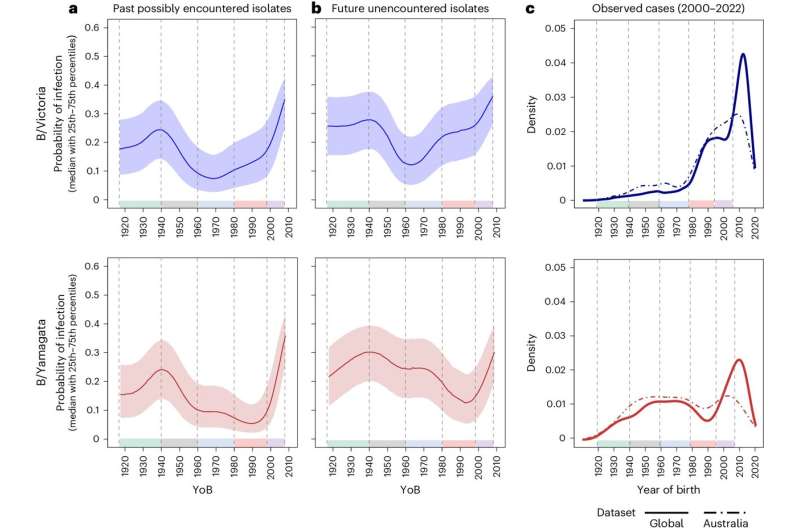June 19, 2024 report
This article has been reviewed according to Science X's editorial process and policies. Editors have highlighted the following attributes while ensuring the content's credibility:
fact-checked
peer-reviewed publication
trusted source
proofread
Researchers find bigger immune response to flu variants in people who were exposed in childhood

An international team of microbiologists and infectious disease specialists from Australia and the U.S. has found that children exposed to variants of influenza B demonstrate a bigger immune response to the same strain when they are adults.
In their study, published in the journal Nature Microbiology, the group analyzed serum sample data collected from patients over a nearly 100-year span.
Medical researchers have long suspected that early exposure to certain strains of the flu virus may protect adults against the same strain later in life. In this new effort, the research team sought to prove that theory by measuring antibody levels in 1,499 serum data samples collected from flu patients over the years 1917 to 2008 in the U.S. and Australia and comparing immune response to those and other flu strains later in life.
They found that the greatest concentrations of antibodies in a given serum sample tended to correspond with the strain of flu that was most dominant during a patient's childhood—generally during their first five to 10 years of life.
The patterns they found indicate that early exposure to the flu virus influences the way the immune system behaves when exposed to the same strain of influenza B virus later in life. They also found that the immune system tends to respond more strongly to strains similar to those involved in childhood exposures.
This finding, the team suggests, could open up new avenues of research into the best way to handle flu outbreaks. If it is known at the outset of an epidemic or pandemic that certain people will most likely have immunity against the strain behind the new outbreak, it could lessen the need for broad vaccination efforts, thereby making it easier to slow the spread of the disease and reduce its impact.
They also note that their finding may lead to efforts to understand why early exposure confers a later immune response.
More information: Peta Edler et al, Immune imprinting in early life shapes cross-reactivity to influenza B virus haemagglutinin, Nature Microbiology (2024). DOI: 10.1038/s41564-024-01732-8
© 2024 Science X Network


















